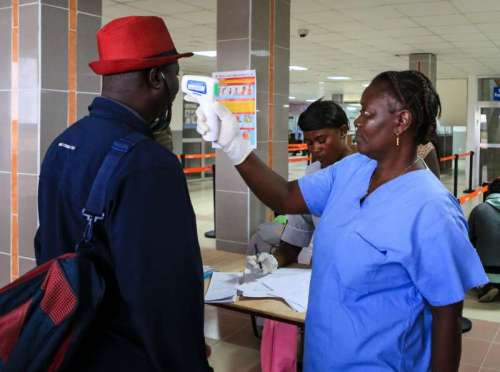 The World Health Organisation (WHO) Monday officially declared Nigeria Ebola-free , after no new cases were confirmed in the past 42 days, even as the International Monetary Fund (IMF) appealed to the donor community to provide grants to countries affected by the deadly virus.
The World Health Organisation (WHO) Monday officially declared Nigeria Ebola-free , after no new cases were confirmed in the past 42 days, even as the International Monetary Fund (IMF) appealed to the donor community to provide grants to countries affected by the deadly virus.
WHO Country Representative in Nigeria, Rui Dama Gaz, made the announcement at an ongoing event in the Nigerian capital Abuja, Xinhua reported.
“This is a spectacular success story that shows to the world that Ebola can be contained,” the WHO official said, noting the war against the disease would only end in the region when West Africa was also declared free.
Ebola was spread to Nigeria in July, by Liberian-American Patrick Sawyer who died days after he arrived in Africa’s most populous country. Thereafter, Nigeria officially recorded 19 cases which resulted in seven deaths and 12 recoveries.
The southwestern state of Lagos and the Nigerian oil hub Port Harcourt, capital of southeast Rivers state, were most hit by the outbreak in Nigeria.
Welcoming WHO’s declaration Monday, Nigerian Minister of Health Onyebuchi Chukwu attributed the success to good leadership and collaboration among respective partners.
Noting that within three months the African nation was able to completely contain the Ebola virus, Chukwu specially lauded the strong collective efforts from the medical officials who combated the virus and treated the patients.
While awaiting WHO’s clearance, Nigeria had received global commendations for its robust and effective national response to the virus.
No new case of Ebola was reported in the country since Aug 31.
Meanwhile, in Dar-es-Salam, Tanzania, the IMF appealed to the donor community to provide grants to countries affected by the Ebola outbreak to avoid a decline in their economies.
The Ebola virus has already killed nearly 4,600 people in Guinea, Sierra Leone and Liberia with the WHO saying it was focusing on 15 African countries in its efforts to stop the spread of the deadly virus.
“In the countries currently affected by the Ebola outbreak, fiscal accounts are coming under considerable pressure,” said Antoinette Sayeh, director of IMF’s African Department.
She said the Ebola outbreak was exacting a heavy economic toll, with economic spillovers starting to materialise in some neighbouring countries, Xinhua reported.
Introducing the October 2014 IMF Regional Economic Outlook for Sub-Saharan Africa in Tanzania’s commercial capital Dar-es-Salaam, Sayeh said the affected countries should be supported through grants to enable them to accommodate higher Ebola-related spending.
“The grants should also help avoid an even more pronounced decline in economic activity,” she said.
Sayeh said when grants were not immediately forthcoming, and provided that the public debt levels remained manageable, fiscal debts should be allowed to widen, subject to the availability of financing.
“Should the Ebola outbreak be more protracted or spread to more countries, it would have severe consequences in the affected countries and larger spillovers,” she said.
In a related development, Japan’s Fujifilm Holdings Corporation announced Monday that it will start production of the anti-influenza drug Avigan in preparation for a larger number of patients infected with the Ebola virus, Efe newes agency reported from Tokyo.
“Fujifilm made the decision to ready a larger inventory through additional production in order to ensure a continual supply of a sufficient volume of Avigan if the scale of the infection were to increase further,” said the Japanese multinational photography and imaging company headquartered in Tokyo in a release posted on its website Monday.
Avigan Tablets were developed by Fujifilm Group company Toyama Chemical Co., Ltd. and approved in Japan as anti-influenza drug in March, Xinhua reported.
Its efficacy on Ebola is not confirmed, though some research papers report that Avigan shows efficacy against the Ebola virus in animal testing with mice.
Avigan has already been administered as an emergency treatment to several Ebola patients evacuated from West Africa to Europe. Recent media reports said some Ebola patients have been treated with Avigan in Europe.
The governments of France and Guinea are planning to conduct clinical trials of Avigan tablets in Guinea as a treatment for Ebola in mid-November. Fujifilm has received a request to provide Avigan Tablets and pharmaceutical information on the product for use in these clinical trials, said the company.
If this clinical trial shows the efficacy and safety of Avigan Tablets as treatment for Ebola, Fujifilm is expected to receive requests to provide the products for large-scale clinical use.
Fujifilm currently has stock of Avigan Tablets for 20,000 courses as well as an additional inventory of active pharmaceutical ingredient roughly for 300,000 courses.